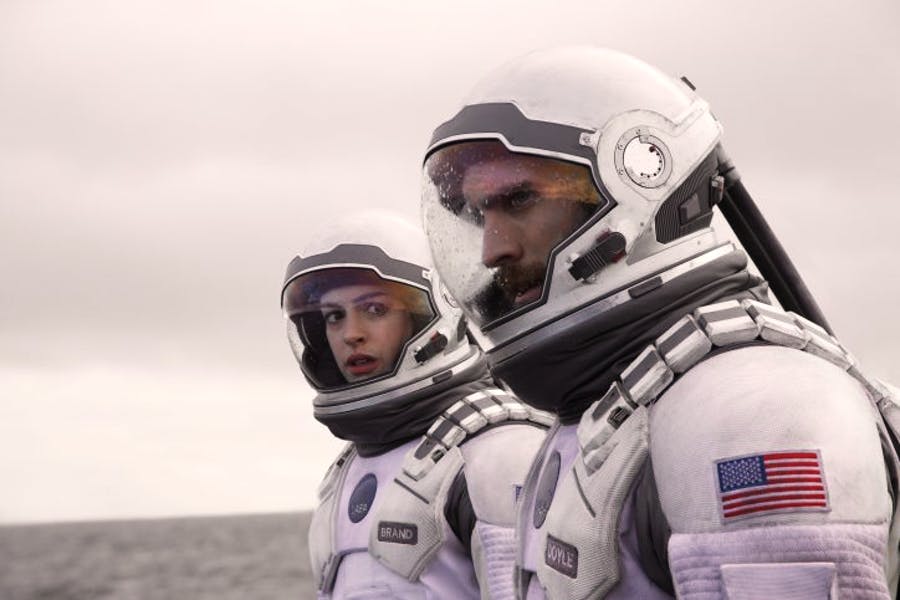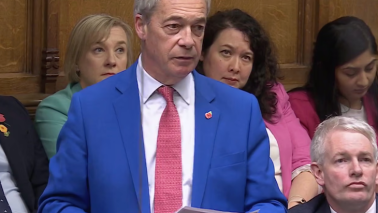This August, if all is well, Christopher Nolan’s eleventh film, Tenet, will be released in cinemas around the world. The storyline apparently involves aspects of time-travel, predetermination and espionage. As usual with Nolan, the details are shrouded in mystery. But it sounds as if it combines many of his usual tropes: a mixture of household name stars (Robert Pattinson, Michael Caine, Kenneth Branagh) with up-and-coming actors (led by John David Washington), beautifully filmed global cityscapes and innovative, gravity-defying action scenes. Practically the only change from before is that his regular collaborator Hans Zimmer, unavoidably detained by other work, will not be contributing a score, which will instead be supplied by the Oscar-winning composer Ludwig Göransson.
At the moment, global events are moving very swiftly, so it is possible that Tenet will have its release date delayed if it looks as if cinemas are not going to reopen in time to screen it. Yet Nolan and his ever-supportive studio Warner Brothers are very keen to give the film industry the theatrical equivalent of defibrillation, and hope that, if the picture is released, audiences will flock to see it, albeit in a socially distanced fashion, and that it will match the mighty box office grosses of Nolan’s previous films.
Which are, it should be noted, hugely impressive. Nolan, a relatively young man – he turns 50 this year – has established himself as a unique figure in contemporary cinema, an auteur who makes personal, cerebral films that thrill audiences and are incredibly lucrative. His major cinematic influences are most obviously David Lean and Stanley Kubrick, but he has also nodded to the eclectic likes of Borges, MC Escher, Francis Bacon and Withnail and I throughout his career. Beloved by cineastes and multiplex-goers alike, the talented Mr Nolan is arguably the most interesting film director working today. These films are the reason why he has such an elevated reputation. Even if they may not all be to all audience’s tastes, they represent one of the most accomplished bodies of work of any 21st century filmmaker.
Memento (2000), Amazon (to buy)
After his low-budget debut Following, Nolan made his American debut with the much-lauded Memento, starring Guy Pearce, Carrie-Anne Moss and Joe Pantoliano. Belying its limited resources with enormous visual panache (its cinematographer was Wally Pfister, who worked on all of Nolan’s films until The Dark Knight Rises) and a script that combines mind-bending complexity with wit and emotion, it thoroughly deserves its Oscar nomination for best screenplay. (If it had won and Gosford Park had not, we might never have had Downton Abbey…) Its narrative, of an amnesiac seeking revenge for the murder of his wife, is told backwards, but if it sounds hard to follow on paper, Pearce’s brilliant performance as Leonard Shelby, tattooing information he desperately needs to remember – or wants to remember – all over his body, gives Memento a very human focus.
Insomnia (2002)
Nolan’s big-budget studio debut is the kind of film that is seldom made two decades later, an adult-oriented psychological thriller with a deeply flawed protagonist and an unwillingness to soften the edges of the 1997 Norwegian film on which it is based. Although he does not have a screenplay credit on it (his only film not to), it is still entirely Nolan’s work, from its time-shifting structure to the moral ambiguity of its policeman lead, played by Al Pacino in a restrained, melancholy performance a million miles away from the histrionics that he has often displayed in his latter-day work.
Its tale of a morally compromised detective who finds himself drawn into a cat-and-mouse game with a crime novelist (played, equally well, by a cast-against-type Robin Williams) is both gripping and surprising, and Nolan’s use of the 24-hour daylight in Alaska to indicate Pacino’s character’s increasingly frayed mental state is a suitably unsettling visual coup.
The Dark Knight trilogy (2005 – 2012), Sky/Now TV
Nolan’s reinvention of the Batman character, last seen being ruined by George Clooney in Batman and Robin, was the significant shift in his career, taking him from interesting director to major Hollywood player. He began his trilogy with Batman Begins, a flawed but fascinating film, which overcomes its studio-enforced touches and Nolan’s obvious inexperience with large-scale action set-pieces by dint of wit, intelligence and a superb all-star cast, topped off with a very fine Christian Bale as Bruce Wayne and Batman.
However it was entirely superseded by The Dark Knight, Nolan’s first billion-dollar grossing film and a truly revolutionary example of what the superhero genre could encompass, not least in the late Heath Ledger’s unforgettable and Oscar-winning performance as the ‘agent of chaos’ The Joker.
Inevitably, The Dark Knight Rises cannot match up to its predecessor, but its staggering action scenes, surprisingly political storyline (inspired by Dickens’ A Tale of Two Cities) and iconic villain Bane, played from behind a mask by Tom Hardy, all combine to make this a fitting summation to the greatest ever trilogy of comic-book films.
The Prestige (2006), Amazon Prime
In retrospect, Nolan’s film about two warring Victorian magicians can be seen as the first instalment of ‘phase two’ of his career. Using the cachet that he had acquired from the success of Batman Begins, Nolan reunites with Bale and Michael Caine, as well as an excellent Hugh Jackman, to revisit themes of duality and illusion, in the context of a time-fractured narrative.
The cast is, as ever, impeccable – David Bowie, in his last major cinematic appearance, plays the mysterious Nikolai Tesla – and there is a heartbreakingly tragic subplot involving Rebecca Hall that belies the criticism that Nolan has sometimes faced that he is a ‘cold director who makes cold films’. A decent rather than staggering box office success, it is the last relatively small-scale film that Nolan directed, and one wonders if he will eventually go back to this kind of production, once he tires of the epics that he currently specialises in. If, of course, he ever does.
Inception (2010), Netflix & Amazon Prime
When I saw the press screening of Nolan’s mind-bending masterpiece – three words that could be used about many of his films – its conclusion was greeted firstly with a collective intake of breath, followed by wild applause and cheering. It isn’t hard to see why.
Inception works beautifully on several levels, whether as a psychological thriller revolving around penetrating the subconscious, an allegorical treatise on contemporary filmmaking (the Leonardo DiCaprio character Cobb could be Nolan himself, a put-upon director attempting to preserve the sanctity of his artistic vision under great pressure from his studio) or as a tragic love story, a motif that runs throughout his career and should probably make his wife (and producer) Emma Thomas feel nervous.
The iconic Zimmer score uses Edith Piaf’s ‘Je Ne Regrette Rien’ brilliantly, Pfister’s cinematography deservedly won an Oscar (as did the visual effects, sound editing and sound mixing) and the gravity-defying hallway fight between Joseph Gordon-Levitt and an anonymous but plucky actor represents as thrilling a glance into the future of action cinema as anything in The Matrix a decade before. Nolan was unlucky not to have won Best Director at the Oscars for the film; unbelievably, he was not even nominated. But the enormous box office take must have gone some way to soothing his pain.
Interstellar (2014), Amazon (rent/buy)
Everyone has their least favourite film by a great director, and, to date, this is mine of Nolan’s. It is a hugely ambitious, visually stunning film that sets its sights on being little less than a 2001: A Space Odyssey for the 21st century, and is anchored by a heroic and charismatic performance by Matthew McConaughey as a crop farmer-turned-astronaut who is tasked with going into space to find a future habitat for humanity. The score is, as ever, transcendent, the cast exemplary and its depiction of a father-daughter relationship hugely moving. Yet something doesn’t quite work.
Perhaps it is the sheer complexity of the time-shifting narrative that results in a third act that is all but incomprehensible, or maybe it is the surprising duffness of some of the writing; Anne Hathaway has to suffer through a speech about the power of love that plays as if it’s been written by a computer. A simpler, more obviously focused storyline would have made for a more satisfying experience, and apparently Nolan was disappointed by the relatively meagre awards recognition it received (best visual effects at the Oscars, and that was its lot.) However, better was yet to come.
Dunkirk (2017), Netflix
Released shortly after Brexit, there was an expectation, especially given the conservative political slant of The Dark Knight Rises, that a film about Dunkirk would somehow be a rabble-rousing piece of jingoism. This was not at all borne out by the picture, which is a remarkably accomplished feat of direction, editing and music.
Set over three overlapping time periods on land, sea and air, Nolan depicts the Dunkirk evacuations with consummate skill, mixing clammy waterborne terror with thrilling aerial dogfights, and manages to bring the whole event to life with a mixture of visceral horror and stunning visual panache.
His cast, which includes old hands Branagh, Mark Rylance and Hardy and young guns Harry Styles and Fionn Whitehead, is as perfectly picked as ever, and its relatively brief running time does not have a wasted scene or moment. Again, Nolan was snubbed at the Oscars, despite being at last nominated for Best Director (in favour of Guillermo del Toro and The Shape of Water), but he can take comfort from having made a staggering piece of full-impact cinema that will rightly be regarded as one of the greatest war films ever made.






Comments